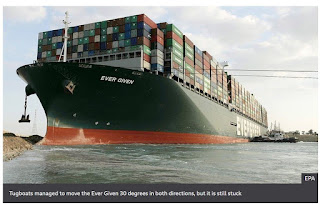For more than 30 years, I have been defending liner conferences and global shipping alliances, and the very 'unique' privileges antitrust laws have been affording them. I have been seeing conference price-fixing, and alliance capacity-management and information-sharing as low cost, self-regulatory arrangements, aiming to prevent competition in a declining average-cost industry (like liner shipping) from becoming destructive; no one would have wanted this[1].
My views
have not changed. But COVID-19 has shown us that carrier privileges have been
abused, mostly due to the
inertia of the (European) regulator and its passive, onlooking, stance. For, although one could
somehow justify carrier capacity arrangements in the first half of 2020, no one
could possibly defend current (2021) tariffs being more than three times their
long-run average (see graph).
This has brought discomfort to the consumer, instead of benefits, as required
by the recently renewed block exemption regulation of the EC.
This
week, transport, port, and logistics associations in Europe, in unity, have written to Ms.
Vestager, the EU
competition watchdog, asking her to initiate a formal investigation into carrier practices,
following the example of the US. And she will have to do this. Convenient onlooking is over.
One of the things I have appreciated much in the letter of
the transport associations -and I dedicate this to my colleagues,
defenders of the megaship idea- is their statement (at long last...) that
without the generous capacity-management privileges afforded to shipping
alliances, these ships would not have existed.
I rest my case.
HH
[1] See our ‘Erasmus Report: Global
Logistics and the Future of Liner Shipping Conferences’. https://www.researchgate.net/publication/294427101_The_Erasmus_Report_Global_Logistics_and_the_Future_of_Liner_Shipping_Conferences.

